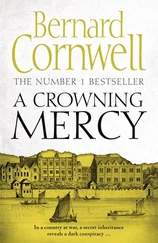‘God saved you,’ one of the men said. The Navarrese on Breteuil’s wall were jeering. A crossbow bolt slapped into a timber of the fallen tower, which was now an inferno of blazing wood. ‘We must get away from here,’ Robbie’s rescuer said.
The second man brought Robbie his sword while the first helped him to his feet and guided him towards the French tents. ‘Roland,’ Robbie asked, ‘where’s Roland?’ A last crossbow quarrel pursued him, skidding uselessly in the mud. Robbie clutched his sword. He was alive, but why? He wanted to weep, but dared not because he was a soldier, but a soldier for whom? He was a Scot, but if he could not fight against the English then what use was he?
‘God saved you, my friend.’ Roland de Verrec, quite unharmed by the tower’s destruction, spoke to Robbie. The Frenchman held out his hand to help steady Robbie. ‘You have a holy destiny,’ he said.
‘Tournament!’ a second voice snarled.
Robbie, still dazed, saw his uncle, the Lord of Douglas, standing in the smoke of the burning tower. ‘Tournament?’ Robbie asked.
‘The king is going back to Paris and he wants a tournament! A tournament! The English are pissing all over his land and he wants to play games!’
‘I don’t understand,’ Robbie muttered.
‘Wasn’t there someone who played the lute while his city burned?’
‘Nero,’ Robbie said, ‘I think.’
‘We’re to play at tournaments while the English piss all over France. No, not piss, while they drop great stinking turds all over King Jean’s precious land, and does he give a rat’s fart for that? He wants a tournament! So get your horse, pack up, be ready to leave. Tournament! I should have stayed in Scotland!’
Robbie looked around for Roland. He was not sure why, except that he admired the young Frenchman and if anyone could explain God’s reason for inflicting this defeat then surely it was Roland, but Roland was deep in conversation with a man who wore a livery unfamiliar to Robbie. The man’s jupon displayed a rearing green horse on a white field, and Robbie had seen no other men in King Jean’s army wearing that badge. The man spoke softly and earnestly to Roland, who appeared to ask a few questions before shaking the stranger’s hand, and when Roland turned towards Robbie his face was suffused with happiness. The rest of the king’s army might be dejected because the hopes of France were now a burning mass of timber in a wet field, but Roland de Verrec fairly glowed with joy. ‘I have been given a quest,’ he told Robbie, ‘a quest!’
‘There’s going to be a tournament in Paris,’ Robbie said, ‘I’m sure you’ll be needed there.’
‘No,’ Roland said. ‘A maiden is in trouble! She has been snatched from her lawful husband, carried off by a villain, and I am charged with her rescue.’
Robbie just gaped at the virgin knight. Roland had said those words with utmost seriousness, as if he believed he truly was a knight in one of the romances that the troubadours sang.
‘You will be paid generously, sire,’ the knight in the green and white jupon said.
‘The honour of the quest is payment enough,’ Roland de Verrec said, but added hastily, ‘Though if your master the count should offer some small token of thanks then I will, of course, be grateful.’ He bowed to Robbie. ‘We shall meet again,’ he said, ‘and do not forget what I said. You have been saved for a great purpose. You are blessed. And so am I! A quest!’
The Lord of Douglas watched Roland de Verrec walk away. ‘Is he really a virgin?’ he asked in disbelief.
‘He swears so,’ Robbie said.
‘No wonder his right arm is so bloody strong,’ the Lord of Douglas said, ‘but he must be mad as a sack of bloody stoats.’ He spat.
Roland de Verrec had a quest, and Robbie was jealous.
‘Forgive me,’ Thomas said. He had not meant to speak aloud. He spoke to the crucifix above the main altar in the little church of Saint Sardos that stood beneath Castillon d’Arbizon’s castle. Thomas was kneeling. He had lit six candles, which burned on the side altar of Saint Agnes where a young, pale-faced priest counted bright new genoins.
‘Forgive you for what, Thomas?’ the priest asked.
‘He knows.’
‘And you don’t?’
‘Just say the masses for me, father,’ Thomas said.
‘For you? Or for the men you killed?’
‘For the men I killed,’ Thomas said. ‘I gave you enough money?’
‘You gave me enough to build another church,’ the priest said. ‘Remorse is an expensive thing, Thomas.’
Thomas half smiled. ‘They were soldiers, father,’ he said, ‘and they died in obedience to their lord. I owe them peace in their afterlife, don’t I?’
‘Their liege lord was an adulterer,’ Father Levonne said sternly. Father Medous, his predecessor, had died a year before and the Bishop of Berat had sent Father Levonne as his replacement. Thomas had suspected the newcomer was a spy, because the bishop was a supporter of the Count of Berat, who had once possessed Castillon d’Arbizon and wanted the town back, but it seemed the bishop had sent the priest in order to rid himself of a nuisance. ‘I pricked the bishop’s conscience,’ Levonne had explained to Thomas.
‘Pricked it?’
‘I preached against sin, sire,’ Levonne had said, ‘and the bishop did not like my sermons.’
Since that conversation, Father Levonne had learned to call Thomas by his name, and Thomas had come to depend on the young, earnest priest for advice, and whenever he returned from a foray into enemy territory he would come to the church of Saint Sardos, say confession and pay for masses to be said for the men he had killed. ‘So if the Count of Villon was an adulterer,’ Thomas now asked, ‘he deserved to be castrated and killed? Father, you’d have to put half this town to death if that was true.’
‘Only a half?’ Father Levonne asked, amused. ‘Speaking for myself,’ he went on, ‘I would have preferred God to determine Villon’s punishment, but perhaps God chose you as his instrument?’
‘Did I do wrong?’
‘You tell me.’
‘Just say the masses, father,’ Thomas said.
‘And the Countess of Labrouillade,’ Father Levonne went on, ‘a brazen adulteress, is here in the castle.’
‘You want me to kill her?’
‘God will choose her fate,’ the priest said gently, ‘but the Count of Labrouillade may not wait for that. He will try to reclaim her. The town prospers, Thomas. I don’t want it invaded by Labrouillade or by anyone else. Send her away, far away.’
‘Labrouillade won’t come here,’ Thomas said vengefully, ‘he’s nothing but a fat fool and he fears me.’
‘The Count of Berat is also a fool,’ the priest said, ‘and a rich one, and a brave one, and he’s looking for allies to fight against you.’
‘Only because he’s lost every time he’s tried before,’ Thomas said. Thomas had captured the town and castle from the count, who had twice tried to reclaim the property, and twice had been defeated. The town lay on the southern edge of the County of Berat and was protected by high stone walls and by the river that flowed around three sides of the crag on which the town was sited. Above the town was the castle on the crag’s high rocky summit. The castle was not large, but it was high and strong, and protected by a new gatehouse, turreted and massive, which replaced the old entrance that had been battered down by a cannon. The Earl of Northampton’s banner, the lion and stars, flew from the gatehouse and from the keep, but everyone knew that it was Thomas of Hookton, le Bâtard , who had taken the castle. It was the base from which his Hellequin could ride east and north into enemy country.
Читать дальше












